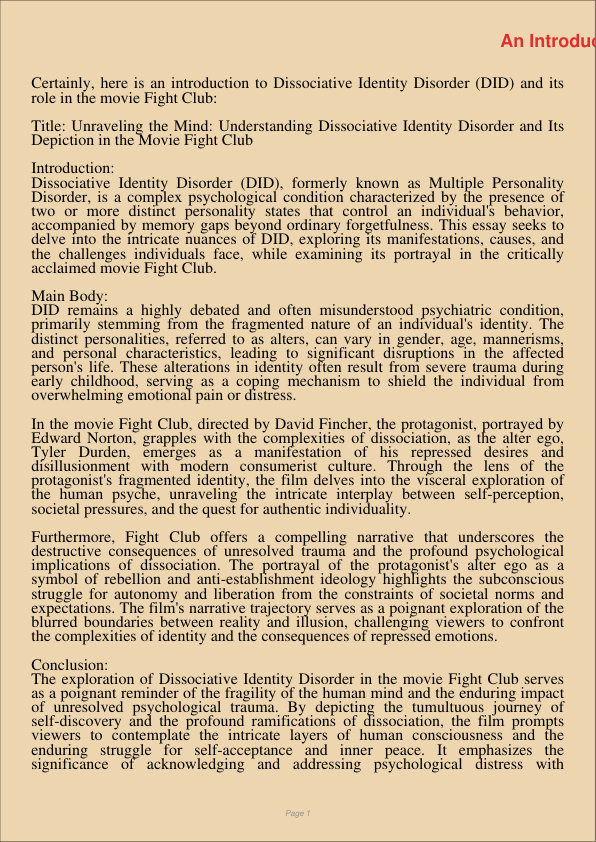
Certainly, here is an introduction to Dissociative Identity Disorder (DID) and its role in the movie Fight Club:
Title: Unraveling the Mind: Understanding Dissociative Identity Disorder and Its Depiction in the Movie Fight Club
Introduction: Dissociative Identity Disorder (DID), formerly known as Multiple Personality Disorder, is a complex psychological condition characterized by the presence of two or more distinct personality states that control an individual’s behavior, accompanied by memory gaps beyond ordinary forgetfulness. This essay seeks to delve into the intricate nuances of DID, exploring its manifestations, causes, and the challenges individuals face, while examining its portrayal in the critically acclaimed movie Fight Club.
Main Body: DID remains a highly debated and often misunderstood psychiatric condition, primarily stemming from the fragmented nature of an individual’s identity. The distinct personalities, referred to as alters, can vary in gender, age, mannerisms, and personal characteristics, leading to significant disruptions in the affected person’s life. These alterations in identity often result from severe trauma during early childhood, serving as a coping mechanism to shield the individual from overwhelming emotional pain or distress.
In the movie Fight Club, directed by David Fincher, the protagonist, portrayed by Edward Norton, grapples with the complexities of dissociation, as the alter ego, Tyler Durden, emerges as a manifestation of his repressed desires and disillusionment with modern consumerist culture. Through the lens of the protagonist’s fragmented identity, the film delves into the visceral exploration of the human psyche, unraveling the intricate interplay between self-perception, societal pressures, and the quest for authentic individuality.
Furthermore, Fight Club offers a compelling narrative that underscores the destructive consequences of unresolved trauma and the profound psychological implications of dissociation. The portrayal of the protagonist’s alter ego as a symbol of rebellion and anti-establishment ideology highlights the subconscious struggle for autonomy and liberation from the constraints of societal norms and expectations. The film’s narrative trajectory serves as a poignant exploration of the blurred boundaries between reality and illusion, challenging viewers to confront the complexities of identity and the consequences of repressed emotions.
Conclusion: The exploration of Dissociative Identity Disorder in the movie Fight Club serves as a poignant reminder of the fragility of the human mind and the enduring impact of unresolved psychological trauma. By depicting the tumultuous journey of self-discovery and the profound ramifications of dissociation, the film prompts viewers to contemplate the intricate layers of human consciousness and the enduring struggle for self-acceptance and inner peace. It emphasizes the significance of acknowledging and addressing psychological distress with compassion and empathy, underscoring the importance of fostering a more empathetic and understanding societal dialogue surrounding mental health and identity.
「真诚赞赏,手留余香」
真诚赞赏,手留余香
使用微信扫描二维码完成支付
